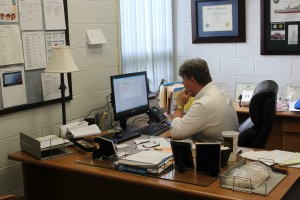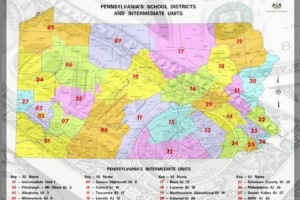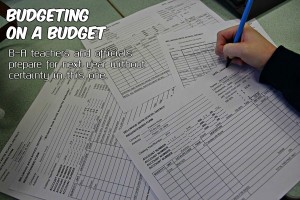B-A budgets for next school year
Teachers and administrators get creative while still addressing budget needs
Teachers and administrators have been forced to find unique solutions for cuts in the budget.
February 9, 2017
It’s the time of the year when departments in the district are planning their budgets for the next school year.
In 2011, Pennsylvania Governor Tom Corbett cut $1 billion from state education funds upon taking office.
However, current Pennsylvania Governor Tom Wolf has taken measures to promote education funding, and in 2015-16 he wrote directly to all superintendents to ensure money will be spent directly on students, giving them the opportunity to compete in today’s modern economy.
Wolf stated two years ago, “Pennsylvania ranks near the bottom of the country in state investment in kindergarten through 12th grade education. We need to change that.”
Wolf’s most recent budget proposal calls for an increase in education spending of more than $200 million.
Still, small, rural schools like Bellwood-Antis continue to feel the ripple effect of spending cuts form several years ago, and they have been forced to use alternative methods so spread their limited funds.
Bellwood-Antis Superintendent Dr. Tom McInroy said most districts have been forced to become more creative with how they spend their funds because of decisions made in Harrisburg.
“Teachers are covering classes because there are not enough substitutes, and it seems as if our lawmakers have declared open season on public schools, and it’s kind of disheartening,” said Mr. McInroy.
While funding has increased recently, past budget cuts have put schools behind the eight ball.
“The Governor recently put $100 million back into education. The problem is the revenues that have been lost since 2011,” said Dr. McInroy. “It’s going to take a lot to get caught up. We’ve been hit with the loss of several teachers, and we’re not going to be able to replace them because of funding.”
As a result, budgeting has forced the district to think outside of the box.
Math Department Chairperson Mrs. Dawn Frank addressed how her department has maintained its necessities.
“We’re pretty much at a bare minimum,” she said. “We’ve been lucky that we are allowed to keep our budget at status quo, and as long as they allow us to stay where we’re at we’ll be good.”
Mrs. Frank said only within the past decade has the math department budget taken major cuts.
“We’ve cut back a lot in the past five years. Since the first time I budgeted nine years ago I have cut my budget in half,” she continued. “Nothing essential gets cut, and if we need something they’re pretty good about getting it to us.”
One step the department has taken, Mrs. Frank said, is purchasing supplies that can be used in multiple math rooms, like rulers and books.
English Department Chairperson Mr. Kerry Naylor shared how the department has been able to maintain resources with recent technology boosts in the classroom, like iPads, which have been distributed in every grade in BASD.
Naylor said, “In the English department we have been fortunate. Many resources are available online, so most of us don’t need to update books frequently.”
Naylor also said that the Bellwood-Antis Foundation has been able to provide the department with grants each year to purchase novels for classroom libraries without putting the books on a formal budget for the district.
Special Education teacher and yearbook adviser Mrs. Summer Carson said she tries to bargain hunt while planning the next year’s budget.
Mrs. Carson stated, “I am very frugal, and I always shop for the best deal, and I like to save costs for the district. But it also depends on the diversity in the classroom and the needs of the students.”
Carson explained that having closer relationships with her student’s parents has helped in saving the district costs on small items like paint, paper, tissues or sanitizer.
“I think having that relationship with parents helps me to get things that I need for my classroom. I have very close-knit relationships with my parents,”” Mrs. Carson said. “So, when we’re running low on classroom supplies, I’ll send a memo, and they are happy to supply our classroom with little things. So then it’s something that the district then doesn’t have to buy.”
Being a special education teacher, Mrs. Carson said her department has a little more wiggle room than other departments when it comes to budgets.
“What’s nice about special education is we seem to have a little bit more flexibility with spending because if a kid needs something we have to get it by law,” she said. “Anything that I have asked for I’ve gotten in the last few years. We’re still working on building our curriculum, building the things we need for the kids to be successful.”









